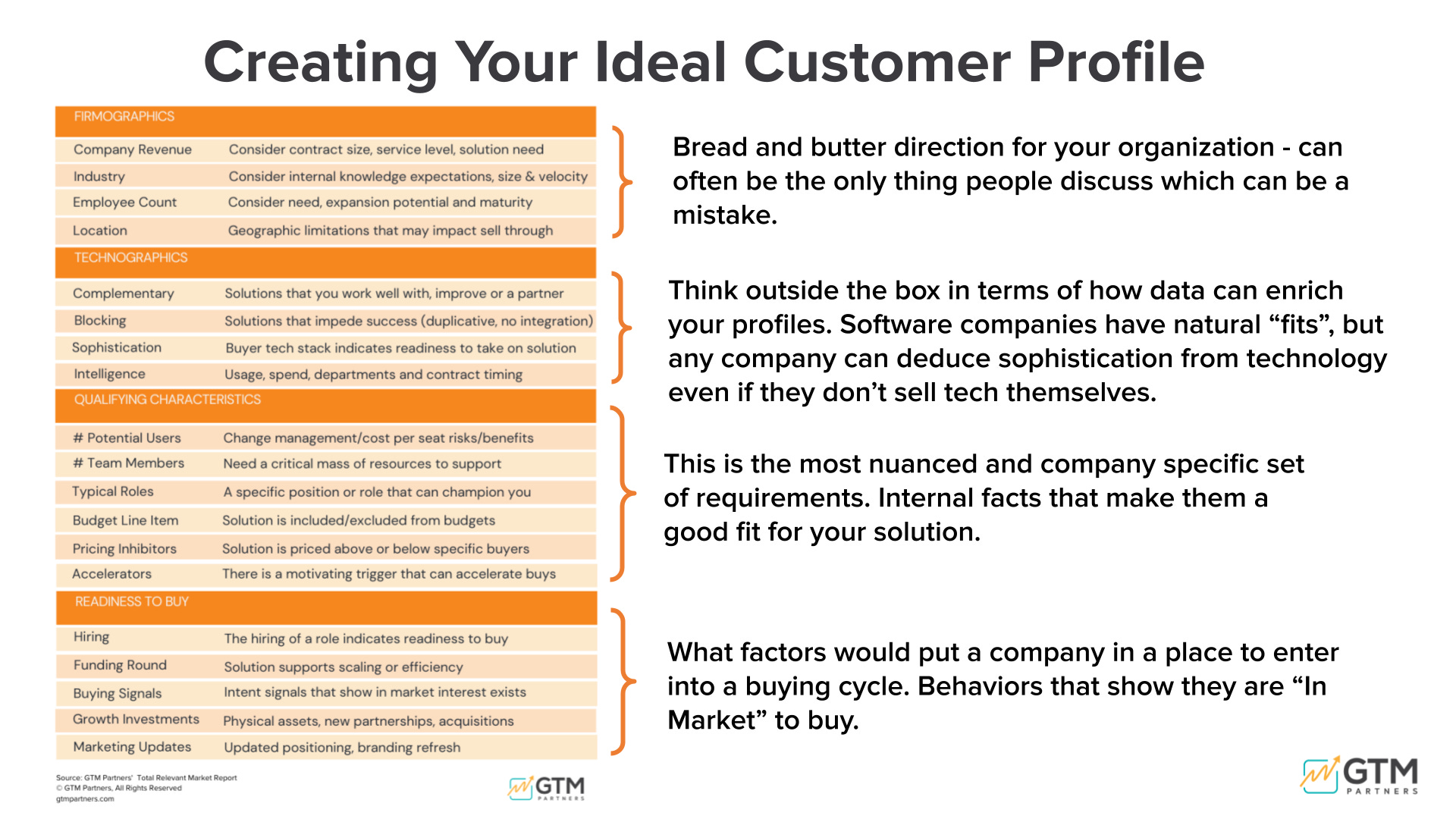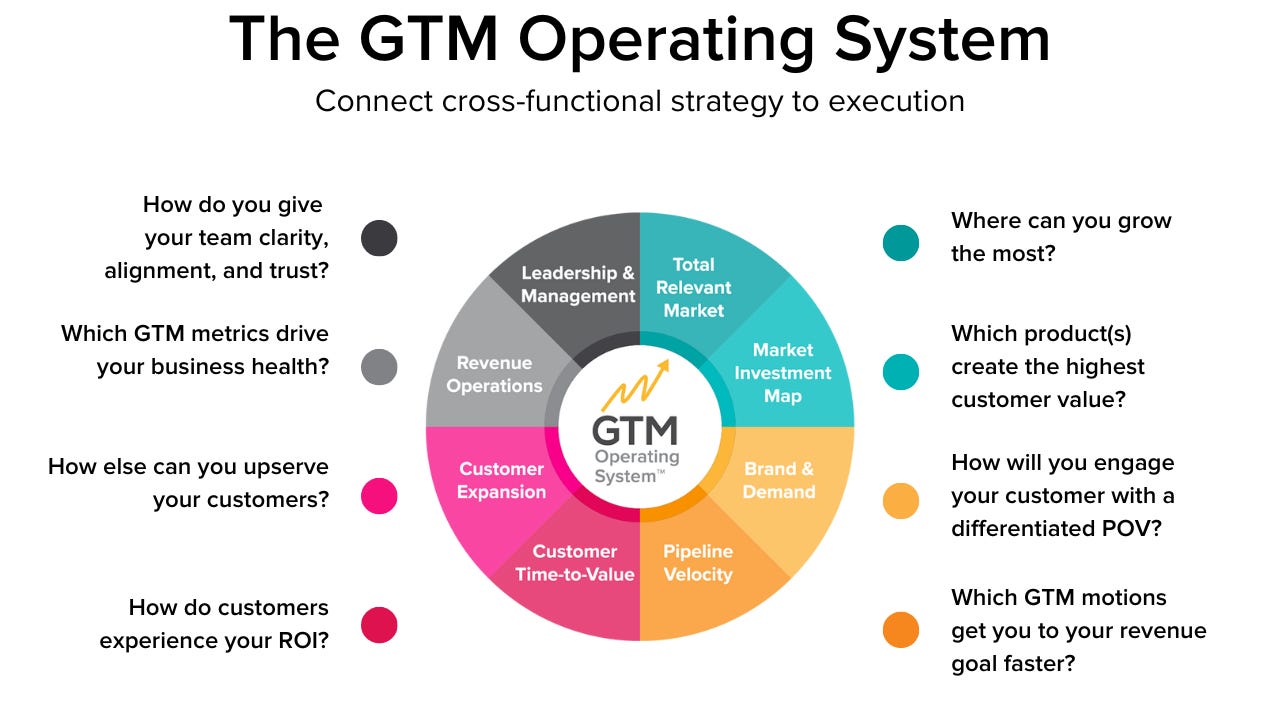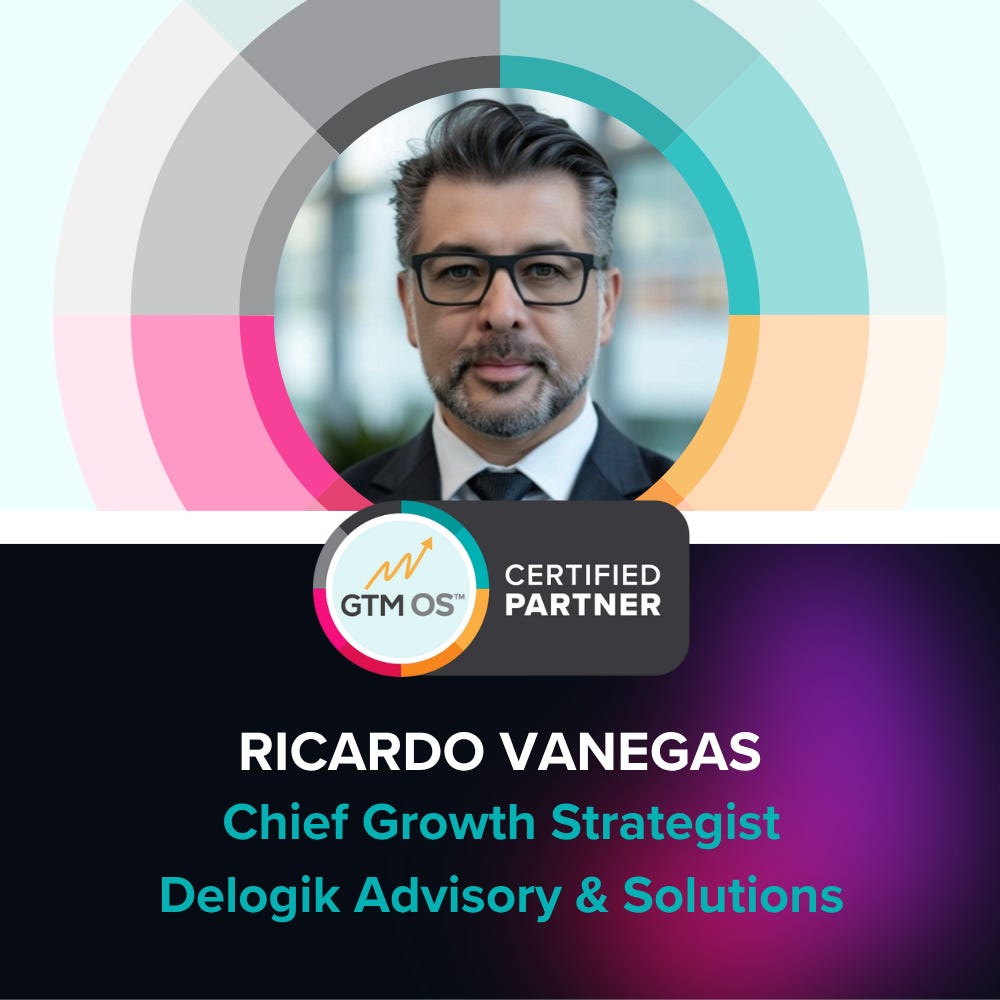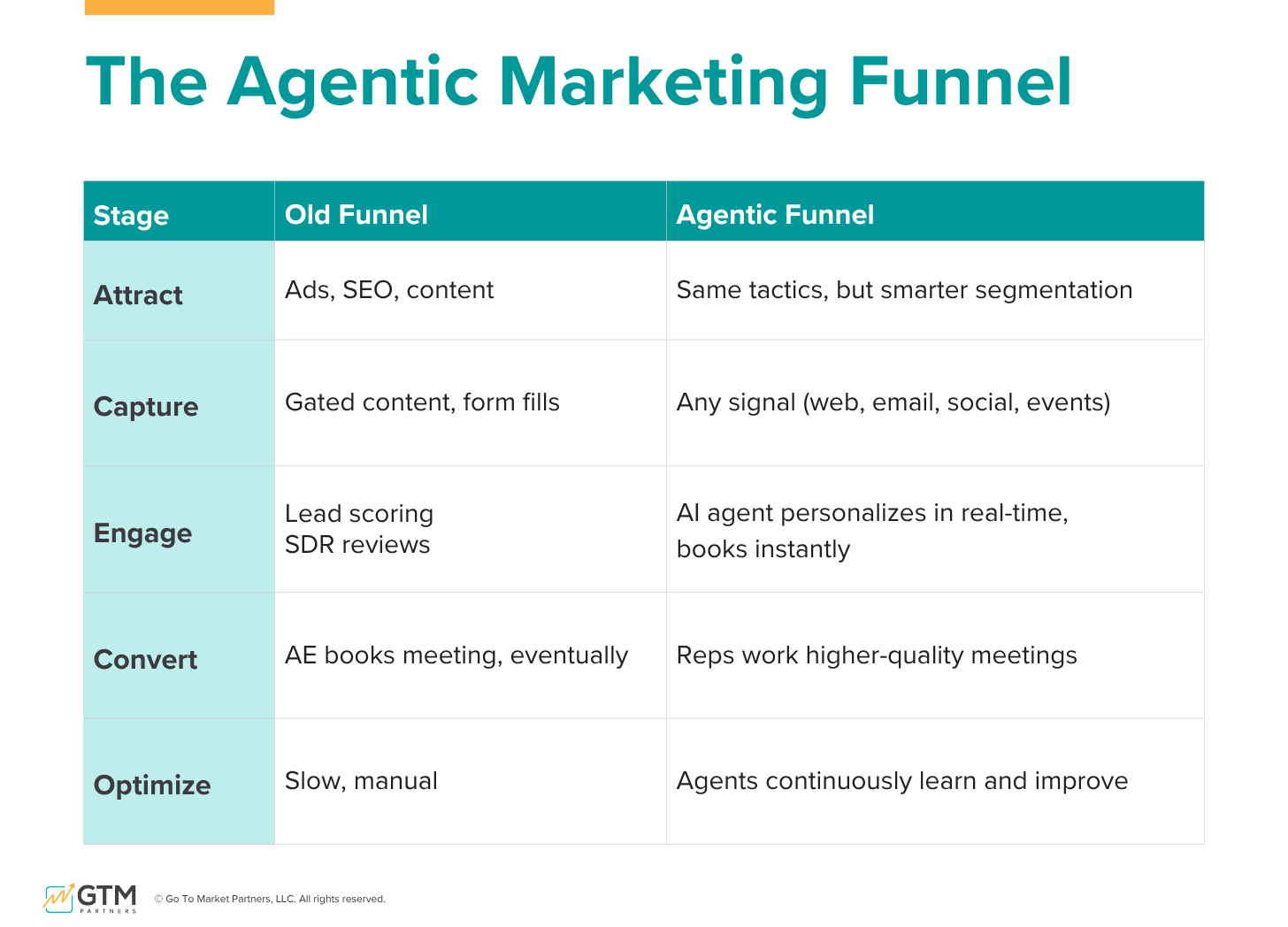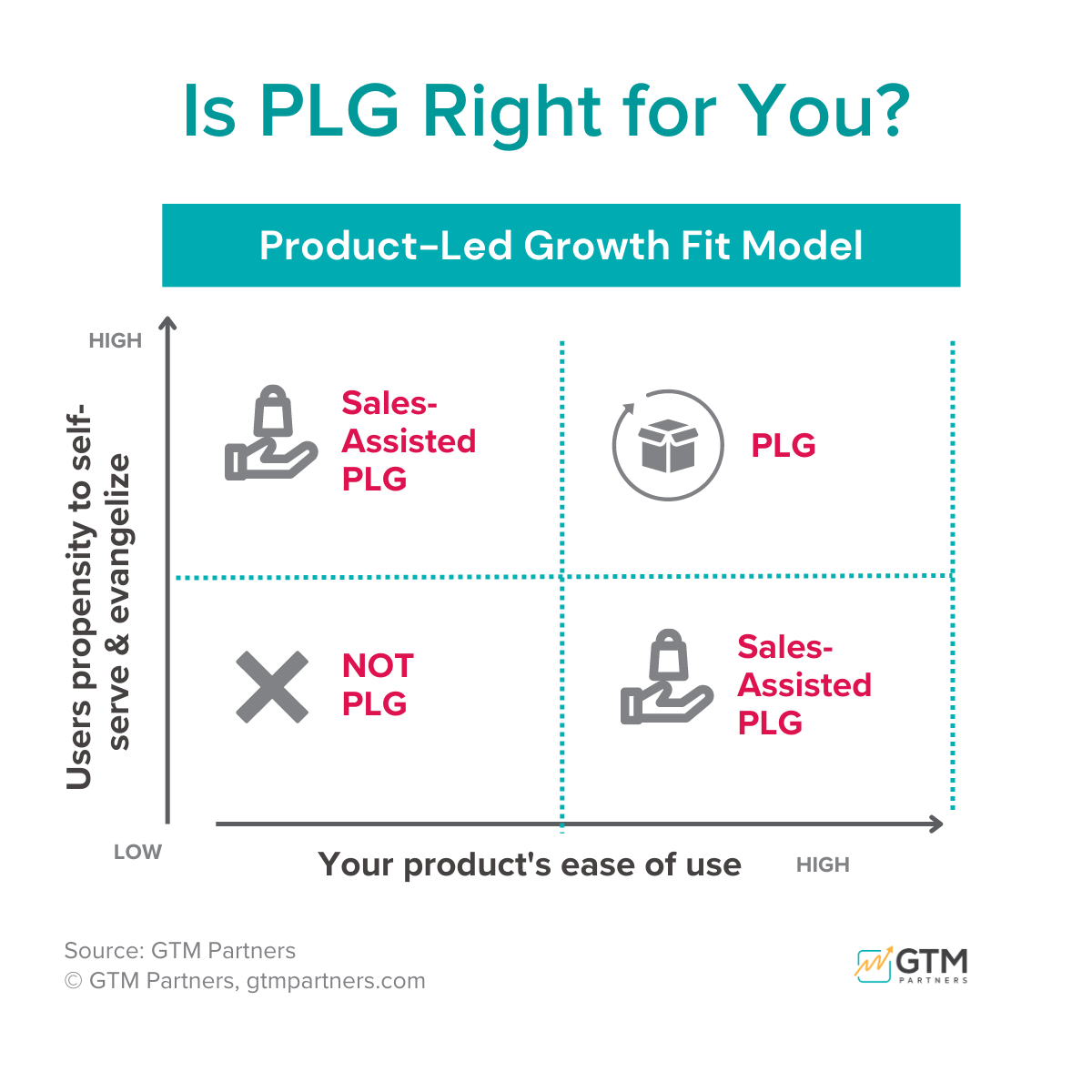Filters
Focus Over Fantasy: This is How You Build Your 2026 GTM Plan (step-by-step)
Thanks for being one of over 178,000 forward-thinking GTM Leaders who subscribe to this weekly research note.
This week’s research note includes:
GTM Research: Building Your 2026 Plan on a Total Relevant Market
Poll Question: How is your company planning to use fractional GTM leaders in 2025?
GTM OS Certified Partner Spotlight: Ricardo Vanegas
Upcoming Events and Access
Research: Why 2026 Planning Starts with Your Total Relevant Market
What if we told you there’s one exercise you could do with your team today that would align your entire go-to-market engine around a single strategy for 2026?
What if nailing this thing would:
Make you 50% more likely to acquire new customers and spend 50% less on sales and marketing. (HubSpot)
Help you generate 30% more pipeline from marketing. (SiriusDecisions)
Make you 67% more likely to exceed sales targets. (McKinsey)
No new tech. No headcount. No budget approval required.
Just clarity . . . on who your best customers are, how to find more of them, and how to stop wasting time on the wrong ones.
It’s not a messaging workshop.
It’s not a campaign brainstorm.
It’s not a funnel review.
The headline of this research brief gave away the punchline! It’s your Total Relevant Market. And it’s the one thing most companies skip until it’s too late.
It’s also the foundation for every single other element of your GTM strategy. It’s the shared understanding that drives the work of sales, marketing, product, and customer success.
From TAM to TRM: Focus Beats Fantasy
Let’s define terms:
TAM (Total Addressable Market) is everyone you could sell to.
TRM (Total Relevant Market) is who you should sell to—the accounts most likely to buy, stay, and grow.
ICP (Ideal Customer Profile) describes your best-fit customers: those most likely to convert, renew, and expand. You may have multiple ICPs within a single TRM.
Think of it this way: TAM is fantasy. TRM is focus.
How to Build and Validate Your TRM
Almost every company says they know their TRM. But when asked, they describe size, revenue, location . . . maybe industry.
That’s not a TRM. That’s a sketch.
With today’s tools and data, there’s no excuse to stay surface-level. The more precisely you define your TRM, the more efficiently you can grow.
High-performing GTM teams use characteristics like:
Firmographics (company size, HQ location)
Technographics (tools in use, data maturity)
Behavioral signals (intent, buying cycles, past engagement)
Strategic context (partner ecosystem, industry dynamics)
Readiness-to-buy (based on trigger events or signals)
So if your TAM is companies over $50million in North America, you may discern that your TRM is companies who have an L&D department, a remote-first work culture, and use Hubspot.
These are knowable things! Focus your marketing dollars and sales efforts on the companies that are most likely to buy, retain, and expand.
Where TRM Fits in the GTM Operating System
Total Relevant Market (TRM) is the first pillar of the GTM Operating System for a reason: every other part of your go-to-market strategy depends on knowing who you’re going after and why.
When TRM is unclear, everything downstream—product decisions, pipeline health, customer experience—suffers.
Here’s how each of the 7 subsequent pillars relies on strong TRM alignment:
2. Market Investment Map
Question: Where can you grow the most?
Your TRM should inform not just who you can reach—but where you should double down. Strong TRM alignment helps you identify the highest-opportunity segments across regions, industries, or buyer types.
3. Brand & Demand
Question: How will you engage your customer with a differentiated POV?
Your messaging, content, and campaign strategy all hinge on your understanding of who you’re talking to. TRM clarity enables a stronger, more resonant brand voice and demand strategy.
4. Pipeline Velocity
Question: Which GTM motions get you to your revenue goal faster?
Knowing which segments move quickly through the funnel—and which get stuck—starts with TRM. It ensures you’re building plays for buyers that are ready to move.
5. Customer Time-to-Value
Question: How do customers experience your ROI?
The more aligned your TRM is with customers who get fast, meaningful results, the faster you can drive value—and measure it. A poor-fit TRM leads to longer ramp times and churn.
6. Customer Expansion
Question: How else can you upserve your customers?
TRM helps you identify not just who to land, but who will expand. When you align around high-LTV customers early, expansion becomes a built-in growth lever.
7. Revenue Operations
Question: Which GTM metrics drive your business health?
Your systems and models are only as accurate as your market assumptions. TRM ensures that forecasting, routing, and segmentation logic are grounded in reality—not guesses.
8. Leadership & Management
Question: How do you give your team clarity, alignment, and trust?
Leadership alignment starts with shared market clarity. A clear TRM creates confidence in goals, alignment across functions, and trust in strategic decisions.
The Bottom Line
Whether you’re heading into a Series B or preparing for IPO, your Total Relevant Market is the connective tissue between strategy and execution.
It’s what makes your GTM plan realistic, your pipeline prioritized, and your budget accountable.
But more than that, it’s your growth compass.
In 2026, the GTM teams that win won’t be the ones shouting the loudest. They’ll be the ones aiming with precision.
If you don’t know exactly who you’re building for, selling to, and retaining, you’re not planning; you’re guessing.
Put This Into Action
You can start mastering TRM today:
Take the TRM course at GTM University to learn how to define, validate, and operationalize your TRM.
Or work with a Certified GTM Partner to implement it across your team.
Poll Question: How is your company planning to use fractional GTM leaders in 2025?
The market for fractional GTM leaders has exploded over the past two years.
We’re curious—how will that trend shift in 2025?
In a few weeks, we’ll be releasing a new report on the state of fractional leadership in 2026.
Certified Partner Spotlight: Ricardo Vanegas at Delogik A&S
Strategic Advisory for Scalable Revenue Growth
Scaling a business is never one-size-fits-all. That’s why Delogik A&S exists—to help small businesses, startups, and mid-market companies unlock consistent, scalable revenue growth with customized, hands-on support.
Ricardo Vanegas at Delogik specializes in Go-To-Market (GTM) strategy, Revenue Enablement, Fractional Leadership, and Business Development-as-a-Service (BDaaS). Their approach goes beyond advice—they embed with your team to design and implement practical, stage-specific solutions that align with your customer segments and growth goals.
Whether you’re launching a new product, pivoting your model, or building toward scale, Delogik helps you get to market faster, operate more efficiently, and drive real results.
Core Services Include:
GTM Strategy & Execution
Revenue Enablement & Operations
Fractional Executive Leadership
BDaaS (Business Development-as-a-Service)
CRM Onboarding & Implementation
Revenue Intelligence & Analytics
Marketing Mix Modeling
If you’re ready to scale smarter and accelerate revenue growth, Delogik brings the strategy and execution to make it happen.
Learn more: Delogik A&S Partner Page →
If you’d like to be a certified GTM Partner like Ricardo and nearly 50 others, we’d love to talk to you about how to make that happen.
Upcoming Events: Where Sangram, Bryan, or a GTM Certified Partner Will Be Speaking
(DM Sangram for a discount code to attend or to get slides after the talk)
Fix Your Revenue Leaks - A GTM Workshop (hosted by GTM Certified Partner Sandy Yu) is running 7 city roadshow on 15 GTM problems in a city near you and there are only three left: Singapore (Nov. 4), New York City(Nov. 13), Melbourne (Dec. 3)
Why Most Startups Don’t Scale: The 15 GTM Mistakes Nobody Talks About (Hosted by GTM Certified Partners Tim Hillison of Entry Point 1, Lydia Flocchini of Motion to Scale, and Tech Crunch). This event is part of Tech Crunch Disrupt 2025, Oct 28, San Francisco
Going to Market, Every Entrepreneur’s Goal (keynote by GTM Certified Partner Don Drury) November 4, 2025 | 7:00 pm - 8:30 pm ET, Newton, MA
Usage Economy Summit (hosted by LogiSense), Sangram will be presenting, Nov 5, San Francisco
The Work Pause: a One-Hour Workday Retreat for GTM Leaders (hosted by GTM OS Certified Partner Sarah Allen-Short), November 12 from 12-1 p.m. EST on Zoom.
Love,
Sangram and Bryan
p.s. Access GTM University | Hire GTM OS Certified Partners | Read Fractional Friday
Thanks for reading GTMonday by GTM Partners!
Subscribe for free to receive new posts and support our research work.

